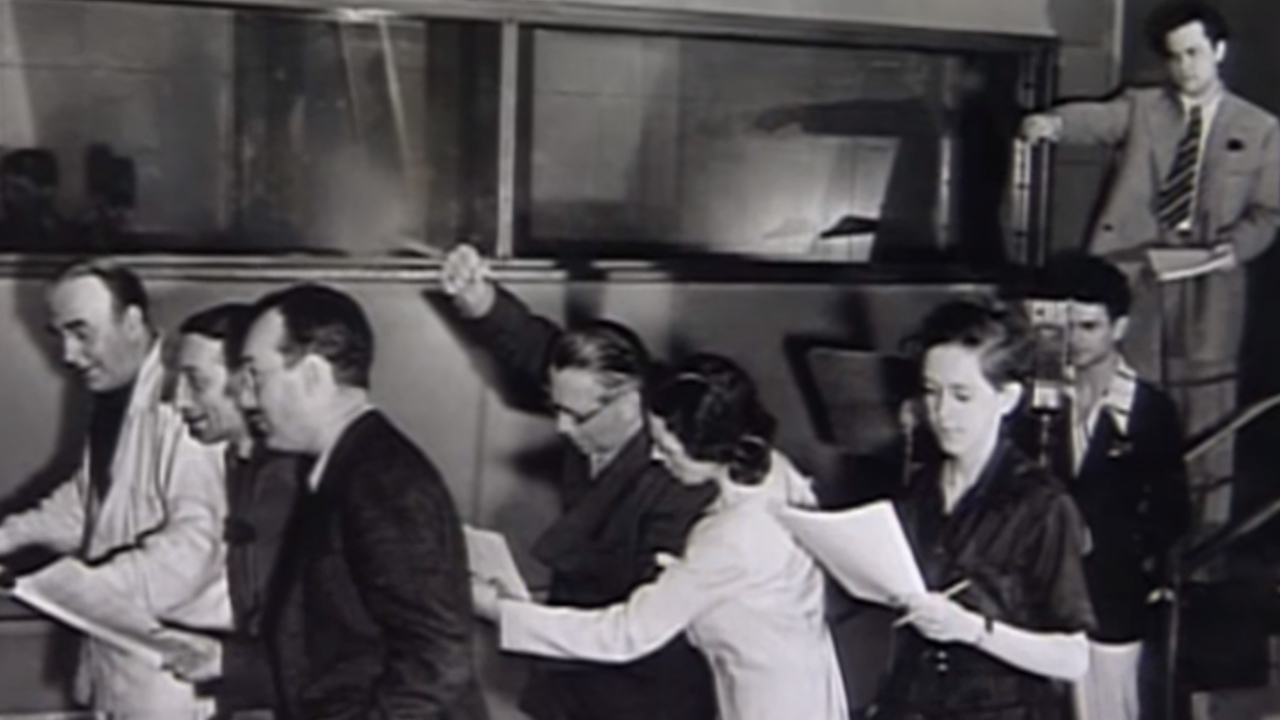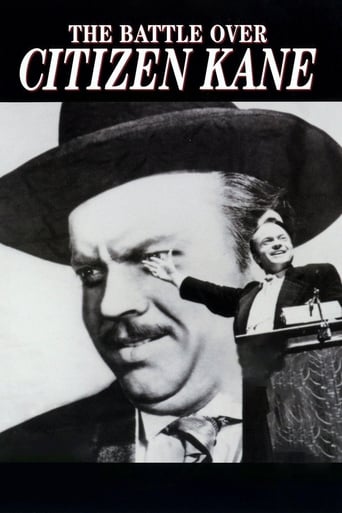


This episode of "The American Experience" was included as a DVD extra for the film "Citizen Kane". It's an exceptional film that is not just about the making of "Citizen Kane" but is also a film about two men--William Randolph Hearst and Orson Welles. Welles made the film and it was a veiled life story of Hearst--though with many fictional elements. This installment of the exceptional PBS series digs deeper--looking for parallels in both their lives--such as their huge egos as well as the way Welles' life mirrored that of Charles Foster Kane in many ways. Using various interviews, photos and film footage, they assembled a very compelling and interesting documentary--particularly for those who love old films. I could easily say more about the film and all that I learned about the personal lives, the production and Hearst's campaign to stop the film--but I'll leave all this to you to learn when you see it.
... View MoreIn the middle of the landmark masterpiece film "Citizen Kane", Leland (Joseph Cotton) criticizes Kane (Orson Welles) about his out-dated political views after Kane has lost an election. Leland states that Kane views himself as a kind of benevolent monarch that has the power to bestow rights on the "working man". Leland furthers his argument to say that Kane ultimately thinks he owns "the people". Leland concludes that "the people" will demand their rights removed from any "gifts" of moneyed magnates. The essence of this scene in "Kane" is what "The Battle for Citizen Kane" is all about. Here, possibly for the first time, politics is critiqued by "entertainment". Welles dared to portray in an unfavorable light one of the most powerful men in the US at that time: William Randolf Hearst.Sometimes truth is stranger than fiction. The truth of Citizen Kane, as hypothesized by "The Battle for Citizen Kane" is that Charles Foster Kane, the "protagonist" of Welles' movie, was not purely William Randolf Hearst. He had a little of Orson Welles in him. Whether intentional or purely coincidental, the character portrayed by Welles was much more rooted in Welles own biography than most people realize, and the end of his life was strangely predicted by the movie. This film is about the two men that gave birth to the film character "Charles Foster Kane". It is also one of the best commentaries on the movie industry of the early 20th century.The movie "Citizen Kane" was not only one of the earliest examples where the entertainment industry made a caustic criticism of politics. It also makes commentary on the entertainment industry itself. Often the general public sees the entertainment industry as just that: an industry presenting escapist material for consumption during leisure hours. What the public doesn't see is how intertwined the entertainment industry is with politics, and how the industry often resists making critiques of politicians when it might jeopardize its own self-interests. This documentary centers around how a movie made in 1940 challenged a living political tycoon. "Citizen Kane" was and still is one of only a handful of narrative feature films that dared to portray a living political force. A couple of others that come to mind are "All the President's Men" (made after Nixon and his top advisers had lost their power) and recently "The Queen", concerning Queen Elizabeth II, still the current monarch of England.Hearst was a 19th-century newspaper magnate who resisted the progressive values of the early 20th century that began to object to the monopolized power of corporate magnates. Hearst began using his newspaper for political means and began blurring entertainment and news almost a century before Fox News appeared on cable television. Thousands of people made Hearst newspapers function, and millions of readers depended upon Hearst and his publications for honest reporting, and Hearst depended upon those readers to maintain his business. However, Hearst categorically discredited these kinds of realities. The newspapers were ultimately his and his alone, a very 19th-century view of business. And he could use and abuse his newspaper to propagate any agenda he wished. For Hearst, the fact that the public paid for his newspapers, and therefore paid for his livelihood, was irrelevant. For a young filmmaker just given "carte Blanche" in Hollywood, Hearst was the perfect subject-matter for a film project that would depict the American dream gone corrupt. Orson Welles was possibly the first director that had the backing of a major Hollywood studio to not only portray but critique the motives and integrity of a living political magnate through the means of cinema.As great a filmmaker as Welles turned out to be, he was too young and inexperienced to understand the power of political and moneyed magnates. Welles was not just playing with dynamite-- he was playing with nuclear weapons. Welles was certainly naive if he thought Hearst was going to take such abuse without fighting back. Hearst did not just fight back, he declared war. The documentary chronicles that war, from the copy of the script that is secretly obtained by a Hearst insider to Hearst's threats to boycott the studios' movie ads. The documentary has it all. It includes superb biographies of both men chronicling the time before their lives dramatically and traumatically intersected. One other unique aspect of the documentary is its use of the film "Citizen Kane" to show aspects of the character Kane that belonged to Hearst and alternate aspects that belonged to Welles.It appears fitting that the only two figures that could match a fictional character like Charles Foster Kane would be William Randolf Hearst and Orson Welles. Ironically, Welles and Hearst created Kane, and Kane changed Welles and Hearst forever after like no other single character in cinematic history. Kane became the Frankenstein's monster that ended up outdoing its creators. Cinema buffs will largely see Hearst as Kane portrayed by Welles--from the young newspaper owner/editor trying to establish a reputation for quality journalism to the corrupt media magnate using his newspapers to push his second wife into entertainment stardom. And Welles would never live down Kane as his first, best and greatest achievement in the entertainment industry. Some in the industry joked that Welles was the biggest has-been in Hollywood at the ripe-old-age of 26 after the completion of "Kane". Welles would certainly make contributions to the field after Kane, but he would never top it, as predicted by a veteran Hollywood journalist at the time. The "Battle for Citizen Kane" portrays one of the strangest triangle of characters ever assembled. And as the film points out, the movie "Citizen Kane" is the one "character" that appears to have had and continues to have a happy ending.
... View More-Maybe Spoilers herein-This film is a documentary about the conflict Between Orson Welles & William Randolph Hearst over the movie "Citizen Kane." There are interviews with many of the people involved with the film. Hearst was a powerful newspaper publisher who sensationalized the news. Many of the stories in his papers were made up. Welles was a radio and theatrical producer who also loved sensationalism. His plays & radio programs were like nothing else seen at the time. His "War of the worlds" broadcast scared the living daylights out of people since it sounded so real. Both men had at least one characteristic in common: They both believed that the ends justify the means. This is how they became successful and how in the end-destroyed themselves and each other.I have two thoughts regarding this battle: 1. I believe that if Hearst wouldn't have raised a racket over the film, The movie would have been destroyed. Because, People would not believe that Hearst was the kind of man Welles portrays. However, since he did raise a racket people wondered if the events depicted in "Citizen Kane" are true. Otherwise, he wouldn't have raised a racket. 2. These two men were their own worst enemies. There lifestyles and The way they conducted business would eventually come back to haunt them and it did. If you fly too high too soon, you will crash-what goes up MUST COME DOWN! The film "Citizen Kane" set these two on a collision course-they did 15 rounds in the ring and killed each other in the process.Both the newspaper and film industries can learn many lessons.1. The newspaper industry: Never let one man have that much control. There must be accountability here-It is irresponsible to make up stories about living people. In many cases(As he did with Orson Welles)if he didn't like you it was not pretty. This is not what the founding fathers had in mind when they gave us freedom of the press.2. The film industry: Never EVER give complete control to one man. While Welles made a brilliant film, it was about a real living person. Regardless how one feels about Hearst, the fact is it is irresponsible to portray him the way he did in the film.In short-another way of saying this for both: NEVER LET THE IMMATES RUN THE ASSYUM!!The only winner in this battle is the film itself. Perhaps Welles could have at least a little consolation over the fact-that this film is now considered one of the greatest films of all time. And in this day of the DVD format-this film will be forever Preserved. Thank God for that!
... View MoreFeature length documentary on the life of Orson Welles and William Randolph Hearst. The making of the film Citizen Kane, the controversy it had, and the battle between Hearst and Welles, with Hearst trying his best to make sure the film never was released. Very Interesting, never dull, and with some bits of trivia about the movie that isn't that well known. *** out of ****
... View More